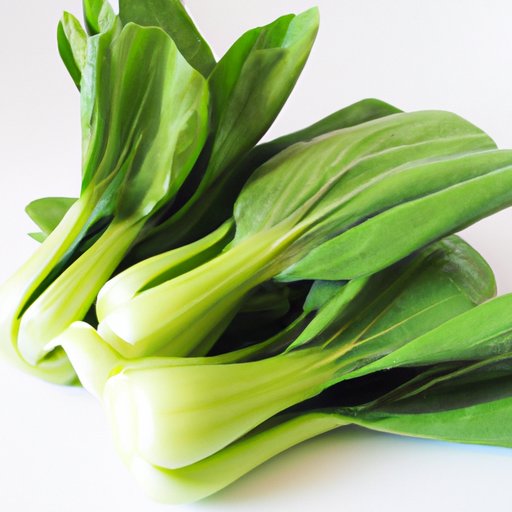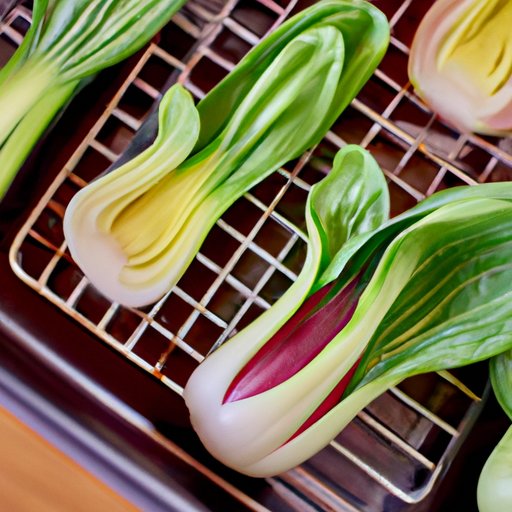
I. Introduction
Have you ever purchased bok choy but struggled to properly prepare it in a tasty way? You’re not alone. Many people are intimidated by this leafy green, but fear not. In this ultimate guide, we’ll go over different methods for preparing bok choy that are both easy and delicious.
II. Bok Choy 101: Understanding the Basics of Preparing this Delicious Vegetable
Before jumping into specific preparation techniques, it’s important to understand the basics of bok choy. Bok choy is a leafy green vegetable that is part of the brassica family, along with other vegetables like cabbage and broccoli. It has a mild, yet slightly sweet and peppery taste and is very versatile in terms of preparation.
Aside from being delicious, bok choy is also very nutritious. It’s low in calories and high in vitamins A, C, and K, as well as fiber and various minerals. Eating bok choy is great for maintaining healthy bones and immune function.
There are a few different varieties of bok choy, each with their own unique characteristics. Baby bok choy is a smaller and more tender version, while Shanghai bok choy is a larger and slightly sweeter option. No matter which type you choose, it’s important to clean and store bok choy properly to get the most out of this nutritious vegetable.
III. Wokking away with Bok Choy: Stir Fry your Way to Deliciousness
One of the most popular ways to prepare bok choy is by stir-frying it. This quick and easy method preserves the crisp texture and delicious flavor of the vegetable. To stir-fry bok choy, you’ll need a wok or large skillet, as well as a few other ingredients.
Cut your bok choy into bite-sized pieces and heat your wok over high heat. Add your oil of choice and sliced garlic and ginger, and stir until fragrant. Then, add your bok choy and cook for a few minutes until it’s slightly wilted but still crunchy. Add soy sauce, salt, and pepper to taste, and serve hot.
If you want to switch it up, try adding other vegetables like bell peppers or mushrooms to your stir-fry. You can also experiment with different sauces like hoisin or oyster sauce for a unique flavor profile.
IV. Preparing Bok Choy: A Step-by-Step Guide to Blanching and Sauteeing
If you’re looking for a gentler cooking method, blanching and sauteing are both great options for preparing bok choy. Blanching involves boiling the vegetable for a short period of time and then immediately cooling it down in ice water. This method helps preserve the bright green color and crisp texture of the bok choy.
To blanch bok choy, bring a pot of salted water to a boil and add your chopped bok choy. Boil for 30-60 seconds, then remove with a slotted spoon and immediately place in a bowl of ice water. Once cooled, remove and pat dry before using in your desired recipe.
Sauteing is another gentle option for cooking bok choy. To saute, heat a bit of oil in a skillet over medium-high heat and add your chopped bok choy and any desired seasonings. Cook for a few minutes until it’s slightly wilted but still crunchy, then remove from heat and serve.
When it comes to blanching vs sauteing, it really depends on your preference and the recipe you’re using. Blanching is great for dishes like salads or cold appetizers, while sauteing works well with warm dishes like soups or stews.

V. Spice Up Your Meal with Bok Choy: Grilling and Roasting Techniques
If you’re looking for a more unconventional way to prepare bok choy, try grilling or roasting it. These methods bring out a smoky and slightly charred flavor that pairs well with a variety of seasonings and sauces.
To grill bok choy, heat your grill to medium-high heat and brush your bok choy with olive oil and any desired seasonings. Place your bok choy on the grill and cook for a few minutes on each side until slightly charred and tender. Remove from heat and serve.
If you don’t have access to a grill, roasting in the oven is another great option. Preheat your oven to 400°F and toss your bok choy with olive oil and any seasonings you’d like. Place your bok choy on a baking sheet and roast for 10-15 minutes until tender and slightly crispy. Serve hot.
VI. One Bowl Wonder: How to Make a Simple and Flavorful Bok Choy Salad
If you’re looking for a healthy and refreshing meal option, bok choy salad is the way to go. This simple and flavorful salad can be customized with your favorite toppings and dressings.
To make bok choy salad, you’ll need chopped bok choy, your desired toppings (like nuts, seeds, or protein), and a flavorful dressing. Combine all of your ingredients in a large bowl and mix until the bok choy is evenly coated in dressing. Serve immediately for maximum freshness.
To enhance the flavor of your bok choy salad, try adding an acidic element like citrus juice or vinegar, and a sweet element like honey or maple syrup. You can also experiment with different textures and flavors by adding fruity or savory toppings.
VII. Soups On: Adding Bok Choy to Your Favorite Brothy Recipes
If you’re a fan of brothy soups like miso or noodle soup, adding bok choy is a great way to up the nutrition and flavor of your dish. Bok choy’s mild taste pairs well with a variety of brothy bases and can add some extra crunch and texture.
To add bok choy to your favorite brothy recipe, simply clean and chop your bok choy and add it to the pot towards the end of the cooking process. Cook until slightly wilted and serve hot. You can also experiment with different types of brothy recipes like ramen or pho for a unique flavor profile.
VIII. Trying Something New: Experimenting with Bok Choy in Your Recipes
The beauty of bok choy is its versatility. Don’t be afraid to experiment with different preparation methods and flavor combinations to find what works for you. Try adding bok choy to your favorite dishes like fried rice or pasta, or swap out your usual greens for bok choy in a salad.
When experimenting, it’s important to keep in mind the different characteristics of bok choy like its mild flavor and crunchy texture. Keeping these qualities in mind can help you create balanced and delicious dishes.
IX. Conclusion
In conclusion, preparing bok choy doesn’t have to be complicated. By understanding the basics of the vegetable and experimenting with different cooking methods, you can create delicious dishes that are both nutritious and flavorful.
Whether you’re stir-frying, grilling, or adding bok choy to your favorite brothy recipe, there are endless possibilities for incorporating this leafy green into your meals. So don’t be afraid to get creative and try something new. Your taste buds (and body) will thank you.




